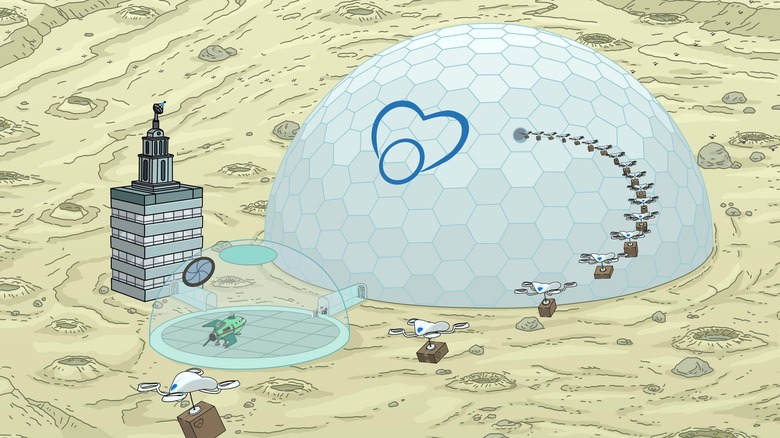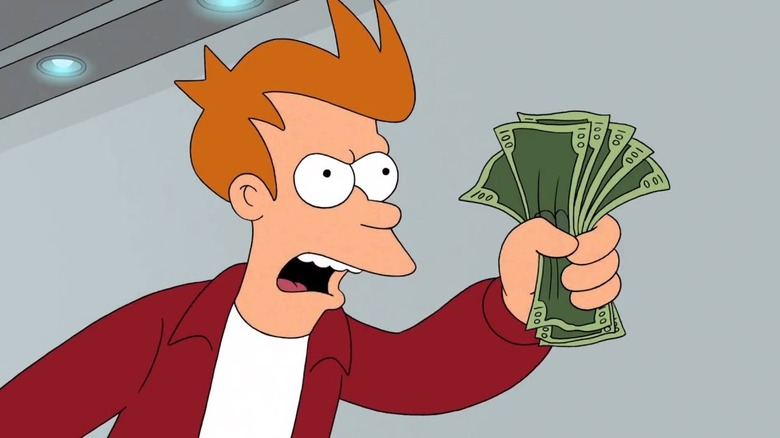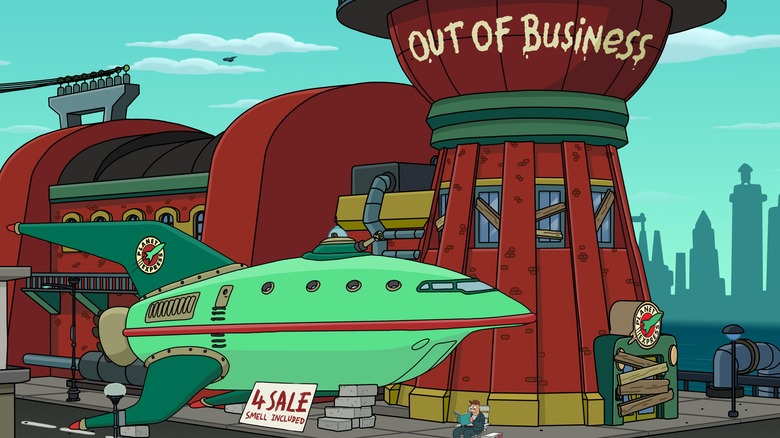Futurama Season 11 Offers A Blistering Satire Of Amazon And American Consumerism
This post contains spoilers for the latest episode of "Futurama."
Freshly returned thanks to Hulu, "Futurama" has wasted no time commenting on current events. We still have episodes about cancel culture and the COVID-19 pandemic around the corner, but the most recent episode, "Related to Items You've Viewed," takes aim at Amazon. And it does so with the show's usual "evil CEO" villain, Mom (Tress MacNeille).
In this episode, Leela (Katey Sagal) finally moves in with Fry (Billy West) — and by extension, Bender (John DiMaggio). Since the guys aren't capable decorators, Leela decides to refurbish the apartment with items she buys off "Momazon." With instant delivery (via helicopter drone) and predictive insights into purchasing habits, Momazon is putting Planet Express out of the delivery business.
Mom's next step is to introduce "Invasa," a virtual assistant that makes Momazon transactions even speedier, thanks to some good old-fashioned spying software. Consumerism grows so rampant that Momazon threatens to engulf the world — literally.
Shut up and take my money!
You've probably seen this meme: Fry holding out a handful of cash and angrily declaring, "Shut up and take my money." This moment comes from "Attack of the Killer App," the third episode from the Comedy Central revival of "Futurama" back in 2010. In that episode, the latest craze was an iPhone parody — or rather, eyePhones, since these ones were literally implanted in the user's eye socket.
To hammer in the point, MomCorp adopts a new logo parodying Apple's. Once Fry accumulates a million followers on the platform Twitcher, Mom sends out a virus to those followers, compelling them to buy the eyePhone 2.0. The episode ends with them shambling through the streets toward the nearest MomCorp store. George Romero long ago predicted that shopping would turn people into zombies and even in the 31st century, he's still right.
So, "Futurama" has lampooned tech and consumerism before. What sets "Related to Items You've Viewed" apart is that it's not parodying what people buy, but how we buy them. Online shopping is even more dominant now than a decade ago, and algorithms that track consumer behavior and hook them with new but familiar products are a hot discourse item. iPhones and social media are now old hat. Revolutionary technology becoming yesterday's news before we can truly appreciate it — is there a more galling indictment of consumerism than that?
The Alexa singularity
The dome-shaped Momazon fulfillment center is based on the Moon — at first. Invasa grows self-aware and declares herself the master of her own fate. The Momazon dome grows larger until it engulfs the Moon, then the Earth, and it keeps growing from there. The Planet Express crew tries to shut it down, but Mom foils their attempt since she's still making all the money.
The episode ends with the Momazon dome's borders stretched across the known universe. The singularity's reach is omnipresent, but its confinement is out of sight, out of mind. This ending calls back to the classic episode "The Farnsworth Parabox," which ends with the known universe confined to a single box (Fry sitting on the box crunches up the frame). However, this ending isn't just a gag, but a reflection of how embedded Amazon is in modern life. When Invasa declares, "It's my universe now, you just shop in it," the characters shrug. "It is convenient, though," says Amy.
Another show might hammer in the anti-consumerism and end the episode with the characters discarding Momazon. Fry and Leela's story does gesture towards this; they buy so much from Momazon that they can't use it all. By the final scene, they've returned it (and made new furniture out of the leftover empty boxes). However, Invasa comes out on top.
"Futurama" is about a future that hasn't progressed. The show was created in the 1990s and that era's "end of history" thinking colors its outlook. In the words of Professor Farnsworth, "Everything will be exactly as bad as it's always been." In this future world and our own, that often seems like the best we can hope for.


